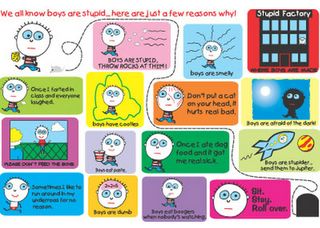The first was a fridge magnet collection sold in the SFU BookStore. [Click on the image for larger view]:

The second was a metal plate found at a garage sale entitled "The Rules" and which read as follows:
1. The Female always makes THE RULES.
2. THE RULES are subject to change without notice.
3. No Male can possibly know all THE RULES.
4. If the Female suspects the Male knows all THE RULES, she must immediately change some of THE RULES.
5. The Female is never wrong.
6. If it appears the Female is wrong, it is because of a flagrant misunderstanding caused by something the Male did or said wrong.
7. If Rule #6 applies, the Male must apologize immediately for causing the misunderstanding.
8. The Female can change her mind at any time.
9. The Male must never change his mind without the express written consent of The Female.
10. The Female has every right to be angry or upset at any time.
11. The Male must remain calm at all times, unless the Female wants him to be angry or upset.
12. The Female must, under no circumstances, let the Male know whether she wants him to be angry or upset.
13. The Male is expected to read the mind of the Female at all times.
14. At all times, what is important is what the Female meant, not what she said.
15. If the Male doesn't abide by THE RULES, it is because he can't take the heat, lacks backbone, and is a wimp.
16. If the Male, at any time, believes he is right, he must refer to Rule #5.
From among the exchanges, two stick in my mind. One is the way that The Rules -- especially Rule 15-- highlight male insecurity / performative masculinity. The other was the suggestion that if "the Female" in The Rules is changed to "God", then you have sixteen points of understanding Kafka's conception of God.
A classfellow from a previous course emailed me the following commentary.
My personal response to popular examples of "kitsch" such as 'The Rules' and the "boys are stupid" magnets is very unsettling. More than the objects themselves, what I find especially disturbing is that these sorts of blatant exploitations of gender stereotypes are intended to be funny. 'The Rules' example in particular operates on exactly the same logic that allowed women to be oppressed for centuries, yet a simple gender reversal apparently makes it appropriate to laugh at today. I think any sort of humor that operates on the principle that a certain sex is contemptible because they necessarily possess some undesirable trait is unacceptable. It is offensive not only to the targeted gender but any person who doesn't feel like they fit the prescribed role for their sex. For instance, I feel insulted by the insinuation that the female is always the pushy, overbearing partner in a relationship, and while most children experience a certain amount of antagonism towards the opposite gender at some point, I certainly don't see how it's appropriate to encourage them to deal with it by throwing rocks. Despite all the intellectualizing university students do about gender theory and social conditioning, the existence of humor like this makes me question whether sexism hasn't simply been institutionalized.









 The documentary from which a short section was shown in today's lecture shows the state of affairs in England in 1970, matching precisely to the narrative-future state of England in Anthony Burgess' A Clockwork Orange
The documentary from which a short section was shown in today's lecture shows the state of affairs in England in 1970, matching precisely to the narrative-future state of England in Anthony Burgess' A Clockwork Orange







 Moulding Elfine to her own, urban, ideals, Flora Poste advises her to turn to "....the style of Jane Austen, or a painting by Marie Laurencin," as exemplars of the sensibility she seeks to impress upon her protégée. Information on the early twentieth-century French painter Marie Laurencin is at
Moulding Elfine to her own, urban, ideals, Flora Poste advises her to turn to "....the style of Jane Austen, or a painting by Marie Laurencin," as exemplars of the sensibility she seeks to impress upon her protégée. Information on the early twentieth-century French painter Marie Laurencin is at 

 Here, as mentioned, is the picture of "the Coll" -- the United Services College, at Westward Ho! in Devonshire, "Twelve bleak houses by the shore ...." -- where Kipling's Stalky & Co. is set.
Here, as mentioned, is the picture of "the Coll" -- the United Services College, at Westward Ho! in Devonshire, "Twelve bleak houses by the shore ...." -- where Kipling's Stalky & Co. is set.










